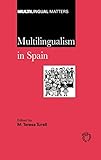Multilingualism in Spain : Sociolinguistic and Psycholinguistic Aspects of Linguistic Minority Groups / ed. by M Teresa Turell.
Material type: TextSeries: Multilingual MattersPublisher: Bristol ; Blue Ridge Summit : Multilingual Matters, [2000]Copyright date: ©2000Description: 1 online resource (408 p.)Content type:
TextSeries: Multilingual MattersPublisher: Bristol ; Blue Ridge Summit : Multilingual Matters, [2000]Copyright date: ©2000Description: 1 online resource (408 p.)Content type: - 9781853594915
- 9781853597107
- 306.44946
- online - DeGruyter
| Item type | Current library | Call number | URL | Status | Notes | Barcode | |
|---|---|---|---|---|---|---|---|
 eBook
eBook
|
Biblioteca "Angelicum" Pont. Univ. S.Tommaso d'Aquino Nuvola online | online - DeGruyter (Browse shelf(Opens below)) | Online access | Not for loan (Accesso limitato) | Accesso per gli utenti autorizzati / Access for authorized users | (dgr)9781853597107 |
Frontmatter -- Contents -- Foreword -- Acknowledgements -- The Contributors -- 1. Spain's Multicultural Make-up: Beyond, Within and Across Babel -- Part 1: The Larger Established Minorities -- 2. The Catalan-speaking Communities -- 3. The Basque-speaking Communities -- 4. The Galician Speech Community -- Part 2: The Smaller Established Minorities -- 5. The Occitan Speech Community of the Aran Valley -- 6. The Asturian Speech Community -- 7. The Sign Language Communities -- Part 3: The Other Established Minorities -- 8. The Gitano Communities -- 9. The Jewish Communities -- Part 4: The New Migrant Minorities -- 10. The Brazilian Community -- 11. The Cape Verdean Community -- 12. The Chinese Community -- 13. The Italian Community -- 14. The Maghrebi Communities -- 15. The Portuguese Community -- 16. The UK Community -- 17. The US American Speech Community
restricted access online access with authorization star
http://purl.org/coar/access_right/c_16ec
Multilingualism in Spain deals with the sociolinguistic and psycholinguistic aspects of established and new migrant minority groups in Spain. Three guiding analytical research approaches cut across minorities in Spain: language, migration and discrimination, although not all aspects apply to all minorities in the same way: some are characterised by language, migration and discrimination; other communities are only defined by language and migration, but their members are not discriminated against socially and culturally; another group of communities are not characterised by recent migration, but they are discriminated against and/or their languages not even officially recognised; lastly, there are some other communities that do not find enough legal and institutional support and their languages may suffer discrimination.
Mode of access: Internet via World Wide Web.
In English.
Description based on online resource; title from PDF title page (publisher's Web site, viewed 01. Dez 2022)


